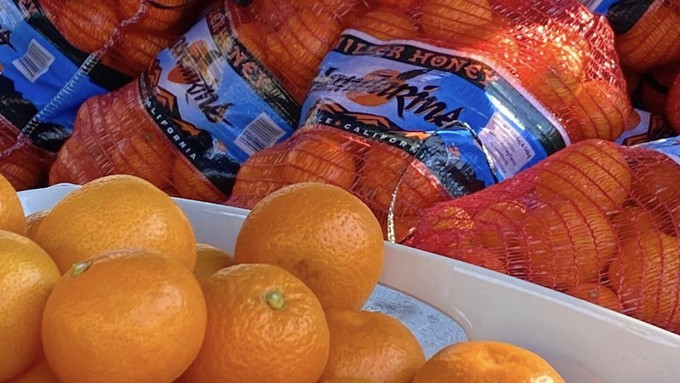
Popular event features tons of fresh fruit and more

Placer-grown fresh mandarins are plentiful this year. Buy them in bags or gift baskets. Photo courtesy Mountain Mandarin Festival
Here’s an annual event with plenty of local zest: The Mountain Mandarin Festival.
Starting Friday, enjoy the three-day citrus celebration at the 29th Mountain Mandarin Festival at the Gold Country Fairgrounds in Auburn.
“Live and in person,” proclaim the festival’s organizers. The popular event returned in 2021 after a year off due to Covid precautions. In 2019, the festival attracted more than 30,000 patrons over its three-day run and a similar crowd is expected this weekend.
“Placer County growers will sell thousands of pounds of fresh mandarin oranges and gift baskets, accompanied by all the free samples you like,” say the organizers. “Join in the fun with food, artisan crafts, and activities featuring the mandarin orange and music!”
This year, there will be plenty of fruit to enjoy. Tons of fresh Placer-grown mandarins are ready for the event as well as countless mandarin-related products.
Scores of farmers and other vendors will be on hand, offering their locally grown fruit and other products. Snack on mandarin-flavored treats. Enjoy live music and performances at the main stage.
“Thousands of filled orange mesh bags (of mandarins) await and jams, jellies, infused olive oils, balsamic vinegar, barbecue sauces and body care products are all available for purchase,” say the organizers. “Visitors are delighted to discover that the food vendors offer everything from mandarin pizza to mandarin glazed wings, mandarin doughnuts and mandarin pulled pork, just to name a few.”
In addition, Placer County master gardeners will staff a booth on Saturday and Sunday. Get your 2023 garden guide!
Hours are 11 a.m. to 5 p.m. Friday, Nov. 18; 9 a.m. to 5 pm. Saturday, Nov. 19; and 10 a.m. to 4 p.m. Sunday, Nov. 20.
General admission is $10; children age 11 and younger are admitted free. Seniors: $7. Friday discount admission: $5.
Gold Country Fairgrounds is located at 209 Fairgate Road, Auburn.
For tickets and details: www.mandarinfestival.com.
-- Debbie Arrington
Comments
0 comments have been posted.Sacramento Digs Gardening to your inbox.
Food in My Back Yard Series
May 6: Maintain soil moisture with mulch for garden success
April 29: What's (already) wrong with my tomato plants?
April 22: Should you stock up on fertilizer? (Yes!)
April 15: Grow culinary herbs in containers
April 8: When to plant summer vegetables
April 1: Don't be fooled by these garden myths
March 25: Fertilizer tips: How to 'feed' your vegetables for healthy growth
March 18: Time to give vegetable seedlings some more space
March 11: Ways to win the fight against weeds
March 4: Potatoes from the garden
Feb. 25: Plant a fruit tree now -- for later
Feb. 18: How to squeeze more food into less space
Feb. 11: When to plant? Consider staggering your transplants
Feb. 4: Starting in seed starting
Sites We Like
Garden Checklist for week of May 11
Make the most of the lower temperatures early in the week. We’ll be back in the 80s by Thursday.
* Plant, plant, plant! It’s prime planting season in the Sacramento area. Time to set out those tomato transplants along with peppers and eggplants. Pinch off any flowers on new transplants to make them concentrate on establishing roots instead of setting premature fruit.
* Direct-seed melons, cucumbers, summer squash, corn, radishes, pumpkins and annual herbs such as basil.
* Harvest cabbage, lettuce, peas and green onions.
* In the flower garden, direct-seed sunflowers, cosmos, salvia, zinnias, marigolds, celosia and asters. (You also can transplant seedlings for many of the same flowers.)
* Plant dahlia tubers.
* Transplant petunias, marigolds and perennial flowers such as astilbe, columbine, coneflowers, coreopsis, dahlias, rudbeckia and verbena.
* Keep an eye out for slugs, snails, earwigs and aphids that want to dine on tender new growth.
* Feed summer bloomers with a balanced fertilizer.
* For continued bloom, cut off spent flowers on roses as well as other flowering plants.
* Add mulch to the garden to maintain moisture. Mulch also cuts down on weeds. But don’t let it mound around the stems or trunks of trees or shrubs. Leave about a 6-inch-to-1-foot circle to avoid crown rot or other problems.
* Remember to weed! Pull those nasties before they set seed.
* Water early in the day and keep seedlings evenly moist.